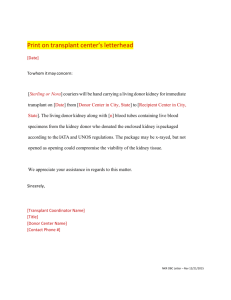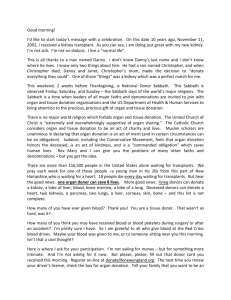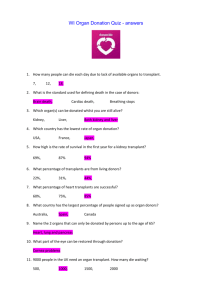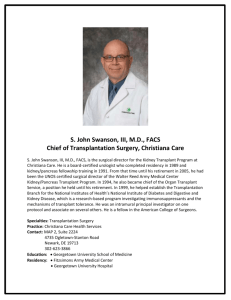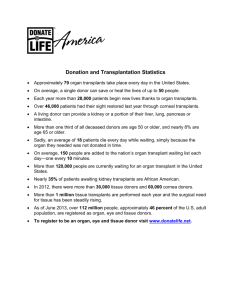kidney donation chain
advertisement
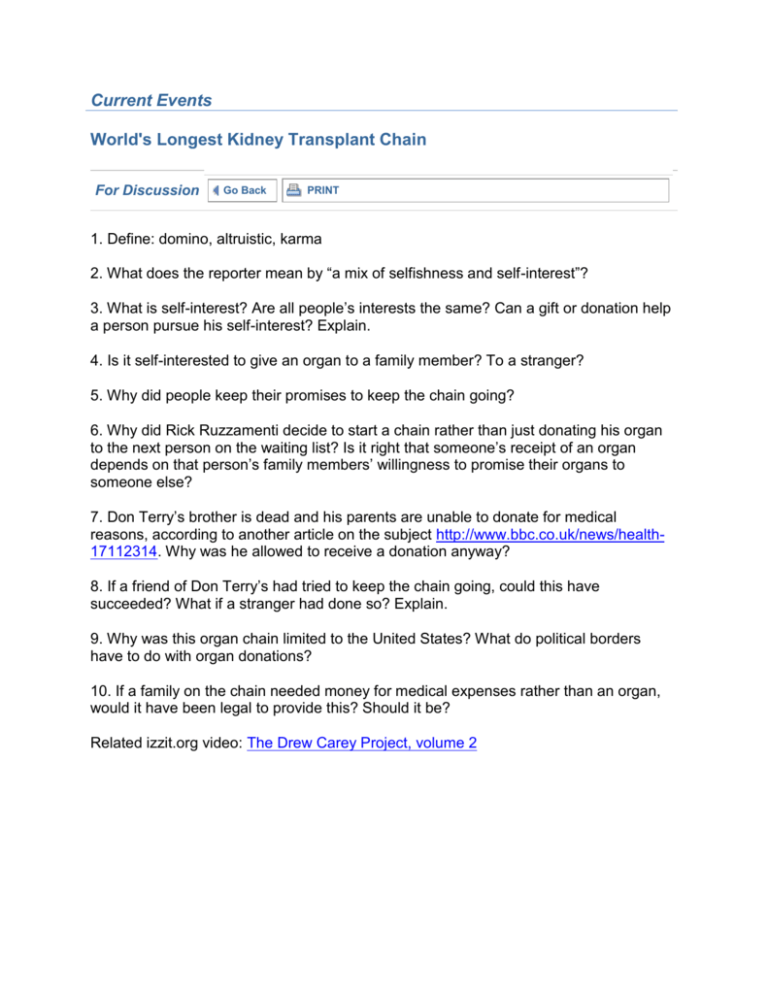
Current Events World's Longest Kidney Transplant Chain For Discussion Go Back PRINT 1. Define: domino, altruistic, karma 2. What does the reporter mean by “a mix of selfishness and self-interest”? 3. What is self-interest? Are all people’s interests the same? Can a gift or donation help a person pursue his self-interest? Explain. 4. Is it self-interested to give an organ to a family member? To a stranger? 5. Why did people keep their promises to keep the chain going? 6. Why did Rick Ruzzamenti decide to start a chain rather than just donating his organ to the next person on the waiting list? Is it right that someone’s receipt of an organ depends on that person’s family members’ willingness to promise their organs to someone else? 7. Don Terry’s brother is dead and his parents are unable to donate for medical reasons, according to another article on the subject http://www.bbc.co.uk/news/health17112314. Why was he allowed to receive a donation anyway? 8. If a friend of Don Terry’s had tried to keep the chain going, could this have succeeded? What if a stranger had done so? Explain. 9. Why was this organ chain limited to the United States? What do political borders have to do with organ donations? 10. If a family on the chain needed money for medical expenses rather than an organ, would it have been legal to provide this? Should it be? Related izzit.org video: The Drew Carey Project, volume 2 Current Events World's Longest Kidney Transplant Chain Belfast Telegraph Go Back Print Belfast Telegraph Organ donation to stranger starts an amazing series of events across 11 US states By Jeremy Laurance Thursday, 23 February 2012 It began with an electrical contractor in Riverside, California called Rick Ruzzamenti who, after chatting to someone in his yoga class, decided to donate a kidney to a stranger. Four months and 60 operations later, the longest kidney transplant chain in the world – with 30 patients receiving a kidney from 30 living donors – was completed when Don Terry, a diabetic who lives in Chicago, received a new organ at the Loyola University Medical Centre. The extraordinary feat, which involved military-style planning, saw operations carried out over four months in 17 hospitals across 11 states, with newly-donated kidneys being flown coast to coast to ensure organs were matched to the right recipient. It was made necessary because none of the patients in the chain was a good match for the loved one who had agreed to donate to them. So each donor agreed to give their kidney to a stranger on the understanding that their loved one would receive a kidney from another donor. A similar feat would not be possible in the UK. British surgeons have decreed that transplant chains involving unrelated donors and recipients may only be established where all operations can be carried out on the same day. They fear that donors may drop out once their relative or friend has received a kidney, if there is a delay before they give their own organ, bringing the domino arrangement to a halt. The US chain began with an altruistic donor – Mr Ruzzamenti – who expected nothing in return. It was then sustained, as the New York Times reported, by a mix of selflessness and self-interest as each donor gave up their organ in return for another to be given to their loved one by someone else. It depended on some remarkable acts of generosity. David Madosh, 47, a tree surgeon from Michigan agreed to donate a kidney to help his ex-wife, Brooke Kitzman, 30, despite their split. He did so, because he did not want their two-year-old daughter to lose her mother. Chain 124, as it was named by the National Kidney Registry, almost fell apart several times. The first operation on Mr Ruzzamenti took place on 15 August 2011. His kidney was flown from Los Angeles to New York where it was taken to Saint Barnabas Medical Centre in Livingston, New Jersey, and transplanted into a 66-year-old man. His niece, a 34-year-old nurse, had wanted to donate her kidney to him but they had different blood groups and turned out to be a poor match. Instead she gave her kidney in exchange for Mr Ruzzamenti's, and it was flown to the University of Wisconsin Hospital, Madison, where it was transplanted into 30-year-old Brooke Kitzman. The chain went on from there with children donating for parents, husbands for wives and sisters for brothers. Nine days after Mr Ruzzamenti's operation, when the first five transplants had been completed, disaster struck. A donor dropped out saying he could not take the necessary two to four weeks off work to recover from the operation. In late October there was another setback when a donor backed out citing unexplained "personal reasons," putting the 23 patients that lay behind him at risk. On each occasion the NKR struggled to find replacements. It succeeded, but not without nail-biting delays. After John Clark of Sarasota, Florida, got his transplant on 28 September at Tampa General Hospital, his wife Rebecca had to wait more than two months before it was her turn to give up her kidney in return. Mrs Clark admitted she had thought about dropping out, but had resisted. "I believe in karma and that would have been really bad karma. There was someone out there who needed my kidney," she said.
